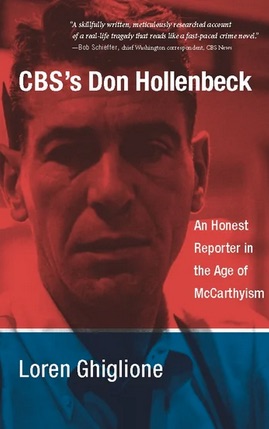Loren Ghiglione recounts the fascinating life and tragic suicide of Don Hollenbeck, the controversial newscaster who became a primary target of McCarthyism's smear tactics. Drawing on unsealed FBI records, private family correspondence, and interviews with Walter Cronkite, Mike Wallace, Charles Collingwood, Douglas Edwards, and more than one hundred other journalists, Ghiglione writes a balanced biography that cuts close to the bone of this complicated newsman and chronicles the stark consequences of the anti-Communist frenzy that seized America in the late 1940s and 1950s.
Hollenbeck began his career at the Lincoln, Nebraska Journal (marrying the boss's daughter) before becoming an editor at William Randolph Hearst's rip-roaring Omaha Bee-News. He participated in the emerging field of photojournalism at the Associated Press; assisted in creating the innovative, ad-free PM newspaper in New York City; reported from the European theater for NBC radio during World War II; and anchored television newscasts at CBS during the era of Edward R. Murrow.
Hollenbeck's pioneering, prize-winning radio program, CBS Views the Press (1947-1950), was a declaration of independence from a print medium that had dominated American newsmaking for close to 250 years. The program candidly criticized the prestigious New York Times, the Daily News (then the paper with the largest circulation in America), and Hearst's flagship Journal-American and popular morning tabloid Daily Mirror. For this honest work, Hollenbeck was attacked by conservative anti-Communists, especially Hearst columnist Jack O'Brian, and in 1954, plagued by depression, alcoholism, three failed marriages, and two network firings (and worried about a third), Hollenbeck took his own life. In his investigation of this amazing American character, Ghiglione reveals the workings of an industry that continues to fall victim to censorship and political manipulation. Separating myth from fact, CBS's Don Hollenbeck is the definitive portrait of a polarizing figure who became a symbol of America's tortured conscience.
- Contents
- Introduction
- 1. The Boy from Lincoln
- 2. Working for William Randolph Hearst in Omaha
- 3. The Founding of PM, a “Newspaperman’s Ideal”
- 4. Politics at PM: Commies and “Good Liberals”
- 5. Covering World War II from Home and Abroad
- 6. Getting Fired by NBC and ABC, Then Hired by CBS
- 7. The Invention of CBS Views the Press
- 8. Jack O’Brian: Buffalo Dock-Walloper to Broadway Drama Critic
- 9. Press Criticism: From Name-calling to Nuance
- 10. J ack O’Brian: Championing Decency, Fighting Soft-on-Communism Liberals
- 11. The Obsession with Subversives and Communist Spies
- 12. Jack O’Brian: Traveling with the Conservative, Anti-Commie Crowd
- 13. The Hearsts Versus Hollenbeck
- 14. Jack O’Brian: Attacking the Communist Broadcasting System
- 15. Loyalty Oaths, Blacklists, and Joseph McCarthy
- 16. The Walking Wounded
- 17. The Sermon in the Suicide
- Epilogue
- Acknowledgments
- Notes
- Bibliography
- Index

